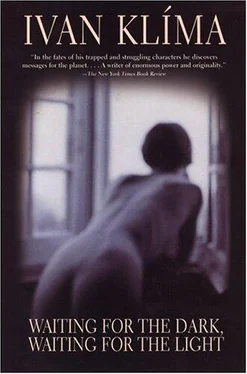She got into her coat, glanced at herself in the mirror again and put on her hat. 'Shall we go?'
They were silent for most of the journey. As they were getting close to where she lived, he asked, 'Was there anything else you wanted to tell me?'
'Why? I've said all I want to say for the time being.'
4
Peter had taken over from Halama and was now Pavel's new boss. Pavel didn't know whether this was good or not. On the surface, not much in his life had changed, but the certainty had gone out of it. He brought footage back from wherever they sent him, and then they broadcast it, without
anyone either objecting or approving. He might tell himself that he had finally achieved independence and responsibility, but in fact the situation made him increasingly uneasy.
He even found it hard to concentrate on his tennis and lost three sets one morning to Sokol. In the showers, when Sokol remarked that the same old thing was starting up again, Pavel asked what he meant.
'You know, first they replace the bosses, then the bosses start replacing the ones underneath them and so it goes, all the way down. Except for the cleaning ladies. They get to stay,' he explained. 'Or maybe you think that's not how it's going to be this time?'
He shrugged his shoulders.
'They say this new guy spent years as a custodian of some castle,' Sokol informed him, 'and that he's a Catholic.'
'Protestant,' he corrected him.
'You know him?'
'A bit.'
'So what do you think he'll do?'
'I don't know. Maybe he doesn't know himself.'
'Maybe he'll ask you for advice, since you know each other.'
'I doubt it.'
'Or maybe you'll be the first to get fired?'
'I don't know. I really don't know.'
'What the hell does a glorified caretaker know about running a television network?'
'He wasn't always a caretaker.'
'Even so. The only thing he'll know for sure is that he's expected to replace us. It would be better not to wait. We'd be wasting our time, and now it's more true than ever that time is money. Have you thought at all about my idea of setting up an advertising agency? Remember, we talked about it? Do you have any idea what kind of money the ones who get in there first will make?'
Pavel shrugged. 'I don't understand why you want me to go in with you.' He'd already finished dressing. He didn't want to talk about it now. He was tired and thirsty after the game.
'A lot of empty buildings will be available now,' said
Sokol, sticking to his subject, 'and if we move quickly we can still get something pretty decent, something we can turn into a studio. It will cost a bit, but if several of us get together. . '
'Why should anyone be in any hurry to give us a building?'
'They'll give it to whoever pays the most, that's how they operate. And if they don't happen to like you or me, we'll do it under someone else's name.'
'Perhaps. But why?'
'God,' sighed Sokol. 'Where do you think you're living? Don't you understand that everything has changed? If we stay in television, we'll always be the black sheep. But if we start out on our own, no one's going to ask us questions about our past, only about what we know and whether we can do the job.'
'I had a different idea about what I'd do when things changed.'
'A different idea?'
Pavel paused for a moment and then said, 'Like making a film that ï really want to make.'
Sokol looked surprised. 'Your own film? And what, if I may ask, would it be about?'
'Did it never cross your mind?'
'What do you mean?'
'You know, that you might have your own way to say the things you always had to say their way?'
'Oh, sure,' he waved his hand. 'But now everybody's going to be doing that.'
'If they still can.'
And you can pull it off?'
'I can at least try.'
'What about money? Where's that going to come from?'
'That remains to be seen. '
'Well, why not? We'll have a studio, and you can make your big film.' He liked the sound of the idea. 'It's probably the one place where you'll be able to do something like that.'
When he finally got back home, three weeks late (he was working all the time), Albina was no longer a patient
at the hospital; she was back at work there.
He waited for her outside the hospital gate. He had a bag of nicely wrapped presents: a necklace of tiny turquoise stones, an alpaca sweater and two small silver pins, but the moment he saw her coming he realized, with a sinking feeling, that not even the most fantastic gifts would be of any help. She must have seen him too, but she didn't quicken her step and her face gave no sign that she was glad to see him.
'So you're back?' she said.
'I'm with you again,' he said, and tried to kiss her.
She pulled away. 'You're not with me, we're standing on the street.'
He wanted to walk her to his car but she refused to go.
'We're going somewhere,' he said.
'No we're not. I wasn't expecting you.'
'You weren't expecting me?'
'I wanted you to come, I wanted you to come a lot, but that was a month ago.'
He tried to explain that he couldn't come, that he had tried to phone her but couldn't get through. She said there was nothing to explain. It was entirely up to him whether he came back or not, and in the same way, it was entirely up to her whether she wanted to stay with him or be alone.
She got into the car with him in the end. She asked him how the trip had gone.
He tried again to explain that he hadn't stopped loving her, it was just that he hadn't been able to come back right away, but she insisted that there was nothing for him to explain. She had always known he would keep running away from her, and that one day he'd leave her for good; it was in him, or rather, there was something missing in him, something he lacked, and lacked so utterly that he wasn't even aware of it.
He asked her if she could at least say what that something was.
She thought for a while, then said that he lacked hope.
Hope for what?
Hope that something in life had real meaning. That life itself had some meaning.
It was odd that she spoke not of love nor of faith, but of hope.
What meaning did life have, then?
It meant, for instance, to be with the one you love when she needs you.
She wanted to get out of the car, but he persuaded her to stay a while longer. So they sat for another hour, but he was incapable of saying anything important. He even forgot to give her the presents he'd brought. But she'd have rejected them, leaving him with the feeling that he'd tried to bribe her. When she got out, she asked him not to phone her any more, or wait for her after work.
But he did try waiting for her for several days after that, although he knew he was waiting in vain. He knew it was all over.
Later that evening he ran into Halama's former secretary, who was now working for Peter. She had been looking for him since yesterday. Her new boss would like to talk to him. 'When?'
'This evening after work.'
Which means when?'
'About nine. Every day. It's terrible, Pavel. I sit there with him, not because I have to, but because I'm afraid he'll think that I've been used to taking it easy. And I've got two kids at home screaming for their supper. '
'He'll get over it.' He went into the editing room to give them a tape of the ceremonial dismantling of the border fortifications. He poured himself a glass of red wine and sipped it slowly, smoking and looking at the screen.
Ministers and lesser representatives of the people were cutting the wire. It seemed soft and fell harmlessly to the ground with a snip of the wire-cutters. Something that concerned him directly was coming to an end. He rewound the tape. He couldn't concentrate. Why did Peter want to see him? Would he try to rub his nose in his triumph, or would he just be friendly? The government ministers on the monitor looked friendly, even human. In fact, they didn't look like ministers at all. This was a different breed of people from the old lot. How long would those expressions last?
Читать дальше











